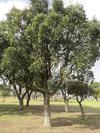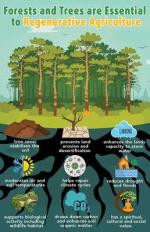How to germinate acorns
On this page I'll show you how I germinated some acorns from a Quercus suber tree in our neighborhood, but first I would like to elaborate on the importance of growing cork oaks with a little history, before the planting description.
Quercus suber in the Mediterranaen
I recently found this anthropological paper by Mark Nesbitt on acorns as food in several different regions of the world, from the Pacific North West of America to Turkey and Japan. It compares preparation methods and there is a lot of diversity.
An online search will show you how important Quercus suber is
for creating a forest ecosystem and supporting a whole range of
endangered species in Mediterranean regions. I found this information in Heidi Gildemeister’s
wonderful book on Mediterranean gardening. It describes drought tolerant plant adaptions and waterwise gardening. It was useful to me, even after years of practicing saving water in the garden.
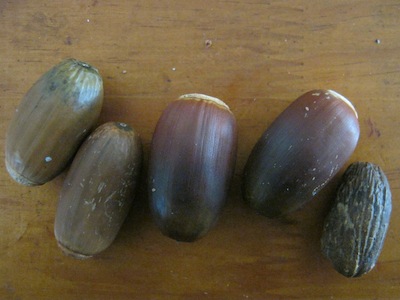 Acorns in various states of freshness. The fresher the more viable as seed.
Acorns in various states of freshness. The fresher the more viable as seed.Gildemeister describes how in the deep past, much of the Mediterranean lands were covered in oak forest, in the western regions mainly Quercus suber or cork oak, and in the drier eastern parts Quercus ilex or holm oak. There were also stands or groves of laurel, and cedars at high altitudes, and umbrella pines on certain types of soil. Then in about 600 BC the olive oil trade took off and the forests of Greece were felled and replaced with olives, which are less soil conservative than oaks with their extensive root mats. Root mats are also a huge part of our summer stress forest ecology at the Cape, and we have seen how destruction of the root mat by trampling feet causes tree death. This planting of olives in Greece set off the desertification of Greece whose results we see today.
Mediterranean trees like
Quercus suber at the Cape
Umbrella pines and cork oaks thrive at the Cape and look healthy and beautiful. However it is a little warmer than the Mediterranean and the cork oaks grow so fast that the cork is not dense enough for corking wine bottles.
Poor plant choices in for our climate
As street trees the predominant tree in certain areas of Cape Town and Stellenbosch is Quercus robur, the ‘English’ oak. It is a poor choice. They grow rapidly in our climate, leading to vulnerable porous wood.
The deciduous European oaks in our streets look awfully shabby and wilt and lose their diseased looking leaves early in the year, because they are not suited to this climate and are subject to many fungal infestations. I like the sulfur shelf or hen and chickens which grows on them, and destroys their structural integrity, but they are often rotten to the core and occasionally a branch falls and kills someone. When they fall in the indigenous forest they rend the canopy and crush other trees and saplings. Their fallen leaves create a suffocating blanket on the ground which inhibits germination of indigenous plants.
Eco insensitivity and markets
Quercus petrea the French barrel oak, grows too rapidly at the Cape to produce dense enough wood for wine barrels. We have to import French oak for our wine industry. This is touted as a adding status to local products. We have the most gorgeous indigenous hard woods, but they would give our wine a flavour unfamiliar to wine connoisseurs. Instead our forests were felled to build houses. They soon ran out in the first few centuries and were replaced with pine trees with high transpiration rates that help plunge us into a cycle of dam building and drought.
Better choices for street trees
At the very least if we must grow oaks here, let them be dry summer oaks, Quercus suber and Quercus ilex. At least they suit our climate and their proportions make it unlikely that they will fall on forest trees and innocent pedestrians and crush them.
Indigenous forest trees are not that hard to raise. My mother was involved in a rehabilitation project and the skills are there. The financial backing is what fails. Sometimes the colonized mindset and the constraints of tradition have in addition to their toxic social and economic impact, a toxic ecological impact, and my respect for connoisseurship becomes qualified by the appreciation of its resounding conservatism and hold over global markets.
it would be economically beneficial to raise the countless local trees with their medicinal bark supporting a multi-million dollar herbalism industry in Africa, but this doesn't happen.
If you would like backup for my statements I suggest you contact SANParks. But beware during a google search. There is a lot of public loudness on conserving oak trees because most people have never seen, identified or learned to love the wealth of indigenous trees we have and this kind of discourse is often highly colonial and has a blind spot about indigeneity and thinking out of the box. In global terms this knowledge of oak tree damage to our forests is new and working knowledge, rather than academic, and people who have accurate information on our indigenous forests have taken decades trying to educate the oak lovers to no avail.
People who are really knowledgeable about ecology tend to be negative about these large aliens.
Germinating acorns from
Quercus suber, the cork oak

We gathered some acorns from a tree in our neighbourhood. We started with five. If you take a closer look at the picture above, we can ponder on their appearance and the germination rate. Three germinated, and in the picture we can see two really healthy acorns, one rather less so, and two really shriveled or damaged ones.
Discard shriveled and damaged acorns
With limited propagation space it may pay to discard shriveled and damaged acorns. They don't germinate.
Plant as fresh as possible
The research also claimed the acorns must be sown fresh and I took it to heart. The reason is that the seeds deteriorate rapidly. This can indeed be seen from the photograph. I did not dally but planted them as I found them each day.
Plant horizontally under an inch of soil
I did some research and sowed the acorns an inch deep in pots of compost-sand mix. I laid them horizontally as described.
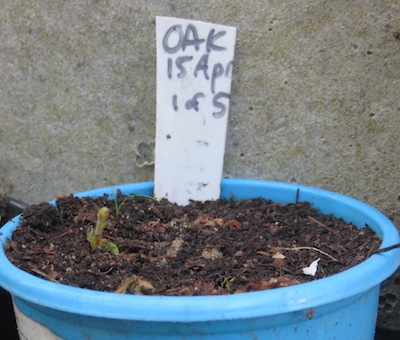 I'd abandoned hope, and then they came !
I'd abandoned hope, and then they came !Be extremely patient.
Don't believe all you read
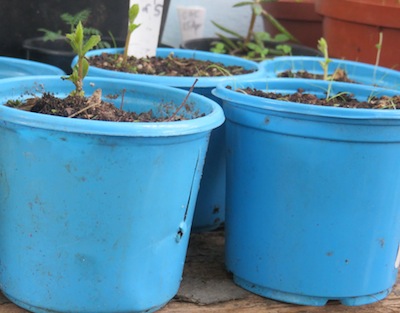 one week old oak seedlings
one week old oak seedlingsSo after about six weeks three seedlings emerged.
The online sources claimed that they would germinate after a fortnight. This is a common failing with online horticultural information. The germination times are often exaggeratedly short. If your stuff does not come up in time, just wait a little longer, much longer, usually.
Plant in deep pots at first or very soon
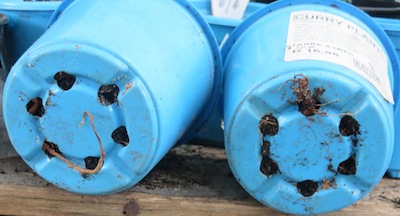 roots grow about ten times faster than the shoots
roots grow about ten times faster than the shootsThe online information also mentions that the trees can be stunted or permanently damaged if they remain too long in a small pot because of the roots being confined. I did indeed see some proof of this. The oak seedlings were only half an inch high when huge tap roots emerged from the bottom of the pot and began to form snarls. On noticing this they were immediately transplanted into large containers.
A fantastic hoard will give more horticultural information
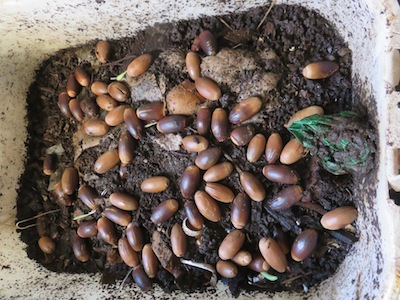 acorns put to germinate in our worm bin
acorns put to germinate in our worm binWe came upon another Qercus suber tree on a longer walk, which had dropped many many acorns and must be in its prime. I could not supply enough pots so I laid them in the dark rich stable environment of the worm bin where many difficult large seeds like avocado germinate without prompting. They will have to be picked out of the worm bin if they germinate.
After more than a month I found ten acorns in the worm bin with emerging radicles. The root emerges long before the leaf. I planted them up. After another month there were no more emergent roots. Therefore there must have been a very small number of acorns which were still viable. But I have discovered a tree with a lot more fallen acorns, triple the number to date.
I hope soon to have a large supply of Quercus suber trees germinated from this mass of acorns. It may allow me to experiment with growing conditions and confirm or deny online lore regarding growing oak trees.
I hope to sell the saplings later as they are suited to Mediterranean gardening and are non invasive from suburban contexts (a bird is unlikely to swallow and drop the seed on the mountain, it would have to be as big as an ostrich). In the meantime I have collected the seed of various indigenous trees growing in urban surroundings and I am trying to propagate a raft of different species.
Hopefully there will be more horticultural information on growing holm oaks and cork oaks on my website by the end of this year.
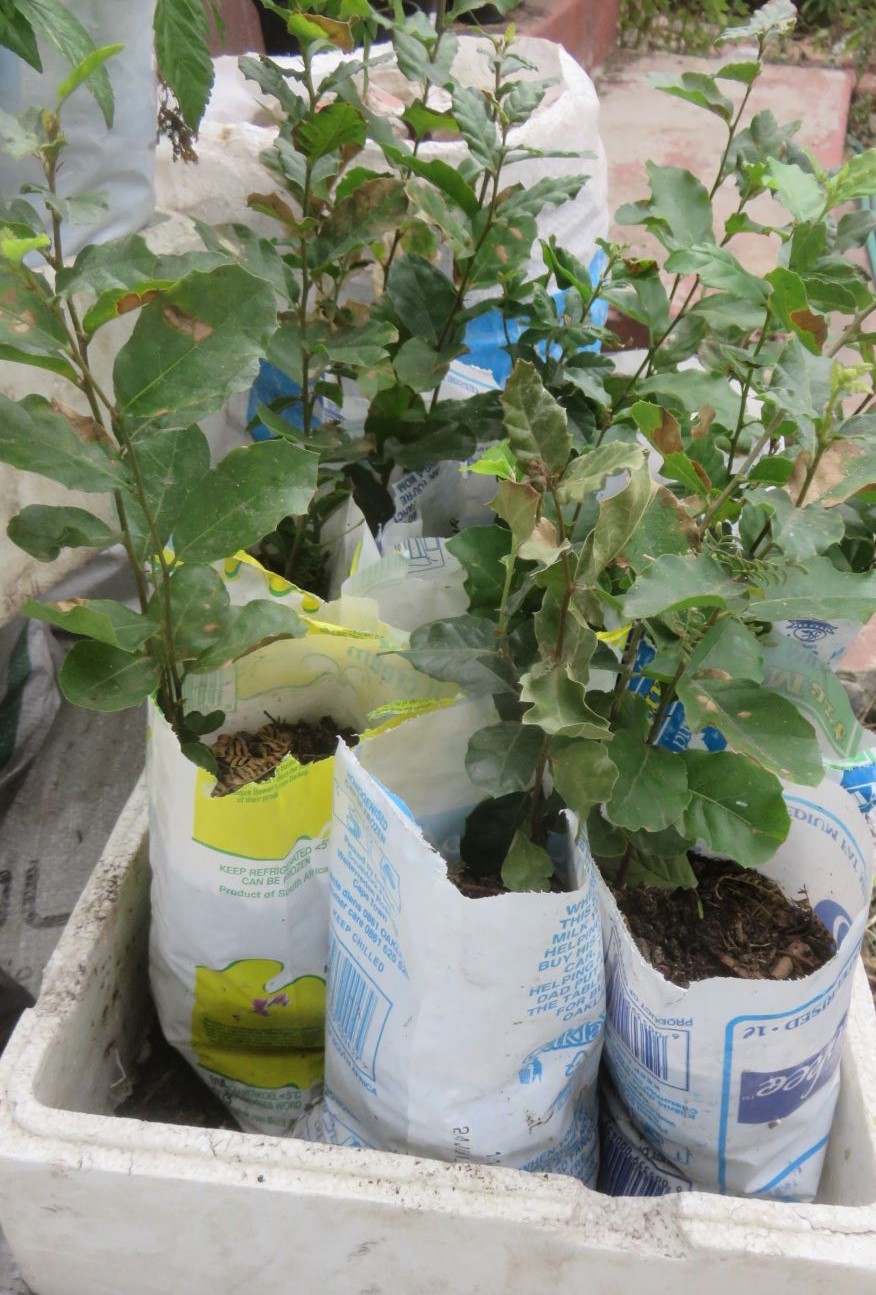 Cork oak saplings are easy to grow, they germinate well. Later on they must be planted on and watered regularly. I've lost most of mine by neglecting them.
Cork oak saplings are easy to grow, they germinate well. Later on they must be planted on and watered regularly. I've lost most of mine by neglecting them.------
Home page for links to lots of natural gardening tips
-------
Growing vegetables and food plants with a list of the easiest vegetables to grow
-------
Pictures which helped me identify Quercus suber
Restore Nature Newsletter
I've been writing for four years now and I would love to hear from you
Please let me know if you have any questions, comments or stories to share on gardening, permaculture, regenerative agriculture, food forests, natural gardening, do nothing gardening, observations about pests and diseases, foraging, dealing with and using weeds constructively, composting and going offgrid.
What Other Visitors Have Said
Click below to see contributions from other visitors to this page...
Anne Theron 




MY grand-daughter picked up some acorns when I was still living in Dundee some lots of years ago and having found them in my cupboard I want to plant them. …
You’re a home gardener ! Share your experiences and questions !
We all know about home gardening. Tell us about your successes, challenges and ask about issues that bother you. You may have the luxury of a back garden, but there are other ways we learn. Few people age without growing something or buying vegetables during their lives ! It is absolutely guaranteed that you have learned things which can help others on their gardening journey.
We invite you to share your stories, ask questions, because if a thing has bothered you it will bother others too. Someone may have a solution ! No question is too small. There is learning for everyone involved, for you, for me (yes, I learn from every question), for us all. Exciting stuff !
We are starting on a new journey. Every week we will profile your letters ! The best stories and questions we receive.
What Other Visitors Have Said
Click below to see contributions from other visitors to this page...
harvesting cypress seeds 




The seeds of the tall cypress, Cupressus sempervirens can be harvested by collecting closed cones and placing them in a box on the windowsill. In a few …
more on acorn germination results 




More pictures, and perhaps an explanation for this snap happy mood ?
The empty empty six-packs, the desolate litre pots
and then... does any other gardener …
more on acorns 




Just some pictures of the larger, transplanted oak seedlings, a germinating acorn, showing how much earlier the root or radicle emerges than the shoot, …
one of my little acorn's family Not rated yet
I found what I'm identifying as a small cork oak grove in a local park, and so I'm posting a picture of the trees, the bark and the leaf. This is not the …
SEARCH
Order the Kindle E-book for the SPECIAL PRICE of only
Prices valid till 30.09.2023
Recent Articles
-
Rose
Dec 17, 23 04:08 AM
I am doing research on growing wildlife foraging plants to use in enhancement plantings with wildlife in mind. My thoughts after seeing bears too skinny -
Seeds for a bred Sweeter less acidic Kei apple
Nov 20, 23 03:24 AM
Greetings Greenidiom, I'm a small farmer in kenya. I'm looking to plant a Green fence around a 6 acre plot of land and, I'd wish to make it of kei apples -
Mrs Laura Robinson
Oct 08, 23 02:17 AM
How do I get a copy of the soil aggregation poster??
"How to start a profitable worm business on a shoestring budget
Order a printed copy from "Amazon" at the SPECIAL PRICE of only
or a digital version from the "Kindle" store at the SPECIAL PRICE of only
Prices valid till 30.09.2023



